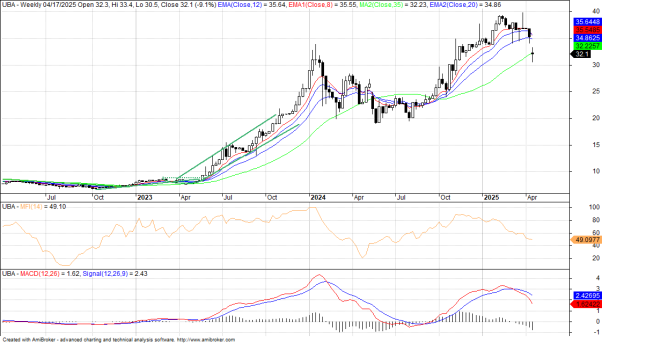Last week’s trading was short on the Nigerian Exchange, following the Federal Government’s declaration of Friday, April 18, and Monday, April 21, 2025, as public holidays to mark the Christian holiday of Good Friday and Easter.
The four trading sessions recorded a mixed trend of two days each of up and down market, after which the week lower on a low traded volume and negative market breadth having started on a bearish note, extending the previous negative outing. It rebounded slightly on Tuesday, but this was short-lived as the NGX All-Share index caved in by 0.63% at the midweek, breaking down the psychological line of 104,000 mark on price adjustments for blue-chip companies and some first-tiers banks.
The last trading session of the week finished higher, when the index rebounded with 0.37%, thereby reducing total loss to 0.32%, reflecting cautious trading among investors who continue to digest the latest inflation reports which showed a halt in disinflationary mode, as Nigeria’s Consumer Price Index rose to 24.23% in the month of March. Also, all eyes are on more Q1 numbers to give an insight into how the economy fared in the first quarter of the year, even as Nigerian Breweries becomes the first to give any hint with its earnings reports that altogether beat expectation.
NGXASI Weekly Chart (Opening chart)
At the same time, market capitalisation for the week settled at N65.499tr, while the All-Share Index stood at 104,233.81 basis points, bringing Year-to-day market gain to 1.27%, behind the blue-chip NGX-30 index which was slightly better at 1.37% in the green. The Pension index increased by 4.98% YTD, Consumer Goods index, 5.68% higher; while the Banking Index dropped 0.86%, far better than the Insurance Index which fell by 13.07%, followed by the Energy Index that recorded a negative return of 10.67%.
Market breadth for the week recorded 31 advancers and 44 decliners.
Abbey Mortgage Bank Weekly Chart
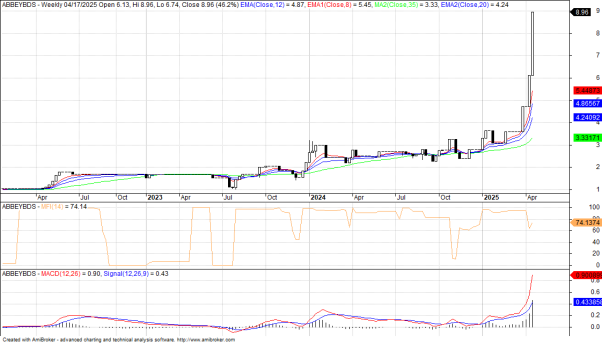
Leading the top gainers chart, Abbey Mortgage Bank Plc a leading Nigerian financial institution specializing in mortgage banking and housing finance, jumped from N6.13 to N8.96, representing a gain of N2.83 or 46.17% in the four-day week on news that VFD Group acquired controlling stake in the fledgling institution. Nigerian Breweries Plc followed, appreciating from N32.00 to N36.20, an increase of N4.20 or 13.13% due to relatively low price and impressive Q1 numbers. Associated Bus Company Plc moved from N1.26 to N1.42, gaining N0.16 or 12.70%. Livestock Feeds Plc rose from N8.54 to N9.50, adding N0.96 or 11.24%. Unilever Nigeria Plc also performed well, climbing from N34.70 to N38.05, representing a gain of N3.35 or 9.65%.
GTCO Weekly Chart
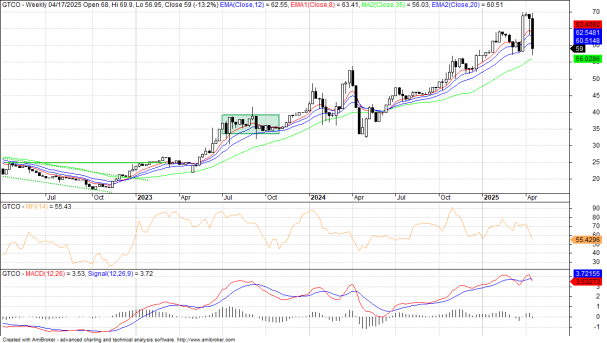
On the decliners’ chart was Guaranty Trust Holding Company Plc a leading financial services group with headquarters in Nigeria, known for its operations in banking and other financial services. Formerly known as Guaranty Trust Bank Plc (GTBank) before undergoing a corporate restructuring in July 2021, becoming a holding company, it topped the week’s laggards’ table after its share price fell from N68.00 each to N59.00, shedding N9.00, or 13.24%. This was attributed to the markdown of its share price by N7.03- the final dividend offered by the directors; Zenith Bank Plc followed, declining from N49.95 to N44.00, a decrease of N5.95 or 11.91%, also due to price adjustment for the N4 final dividend. DAAR Communications Plc dropped from N0.63 to N0.56, losing N0.07 or 11.11%; Caverton Offshore Support Group Plc slipped from N2.54 to N2.27 each, shrinking by N0.27 or 10.63%; R.T. Briscoe Plc closed the list, falling from N2.12 to N1.90, a drop of N0.22 or 10.38%.
Trending in the Economy: Nigeria’s inflation rose to 24.23% in March 2025 from 23.18% in February, driven by rising food, fuel, and transport costs, according to the country’s National Bureau of Statistics. Monthly inflation reached 3.90%, with core inflation at 24.43% and food inflation at 21.79%, reflecting increases in staples like garri, rice, and pepper. Going forward, it is noteworthy that the continued Naira depreciation and higher petrol prices may further impact inflation.
Also, Nigeria and South Africa have signed a mining cooperation agreement to support economic diversification. The deal includes drone-based geological mapping, mineral data sharing, and joint exploration of agro and energy minerals.
With over 23 viable mineral deposits, Nigeria aims to revamp its mining sector, which currently contributes less than 1% to GDP, by leveraging South Africa’s mining expertise.
Global Market and Oil: Global stocks fell Wednesday as the U.S. restrictions on AI chip exports to China and ongoing tariff uncertainties weighed on tech stocks. Nvidia’s projected $5.5 billion loss sent its stock down nearly 7%, leading to a 3.1% drop in the Nasdaq, 2.2% in the S&P 500, and 1.7% in the Dow. MSCI’s global stock index fell 1.5%.
Gold reached a record $3,339 per ounce, driven by demand for safe assets, while the U.S Dollar weakened. Meanwhile, oil prices surged, with Brent crude rising 3.2% to $67.96 per barrel, and U.S. West Texas Intermediate (WTI) gaining 3.54% to $64.68. The gains were fueled by hopes of a U.S – EU trade deal and new U.S. sanctions on Iranian oil, thereby tightening global supply. Both Brent and WTI gained about 5% during the week.
Markets in Europe and Asia also declined, with tech stocks suffering. The World Trade Organization downgraded its global trade growth forecast, just as the U.S retail sales saw a strong growth, driven by preemptive purchases ahead of tariff hikes. Feds’ Chair Jerome Powell indicated the central bank would await more data before adjusting interest rates.
Sectorial Indexes Charts Position
NGX Banking Index Weekly Chart
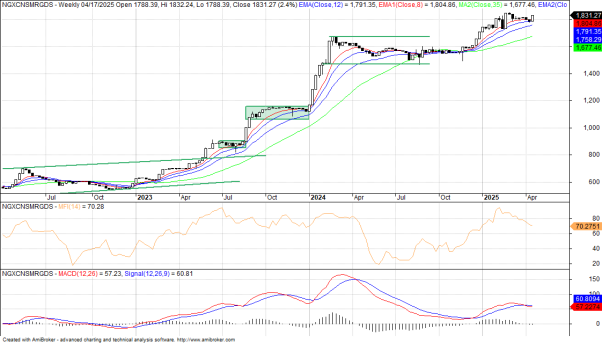
NGX Insurance Index Weekly Chart
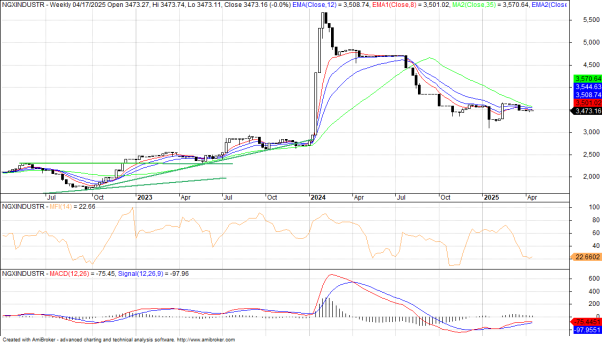
NGX Consumer Goods Index Weekly Chart
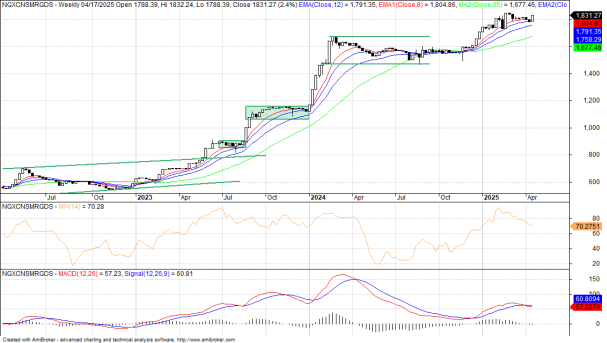
NGX Industrial Goods Index Weekly Chart
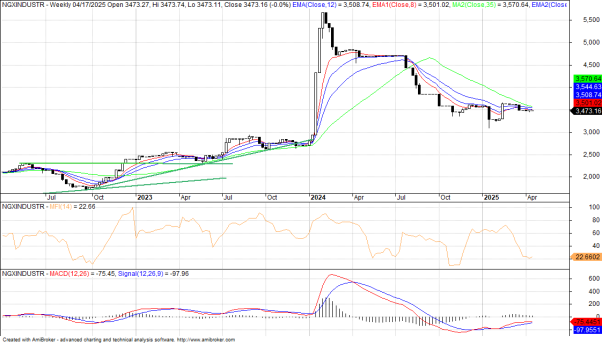
NGX Oil & Gas Index Weekly Chart
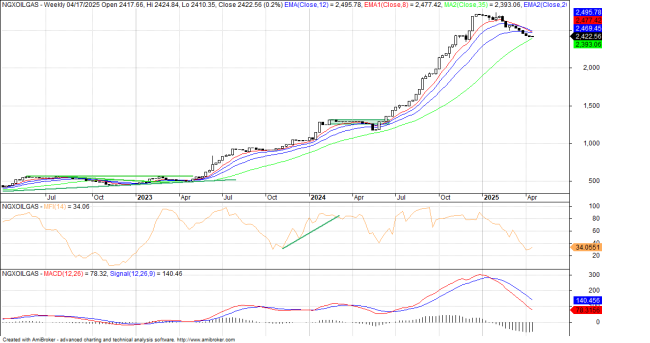
NGX 30 Index Weekly Chart
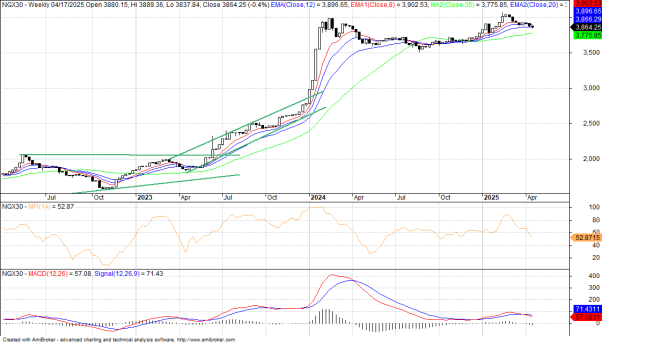
NGX Pension Index Weekly Chart
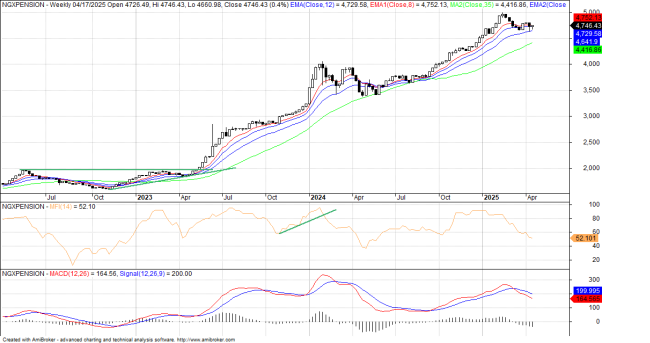
Zenith Bank Weekly Chart
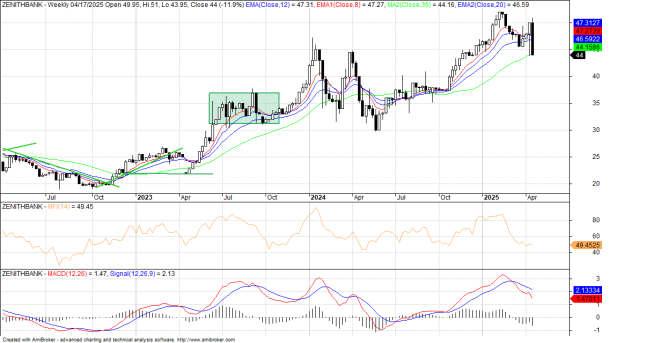
Accesscorp Weekly Chart
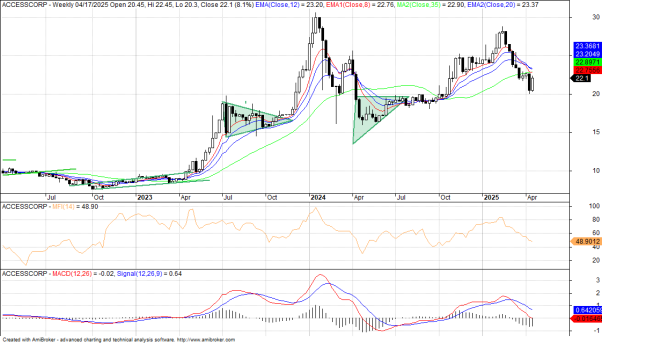
UBA Weekly Chart
